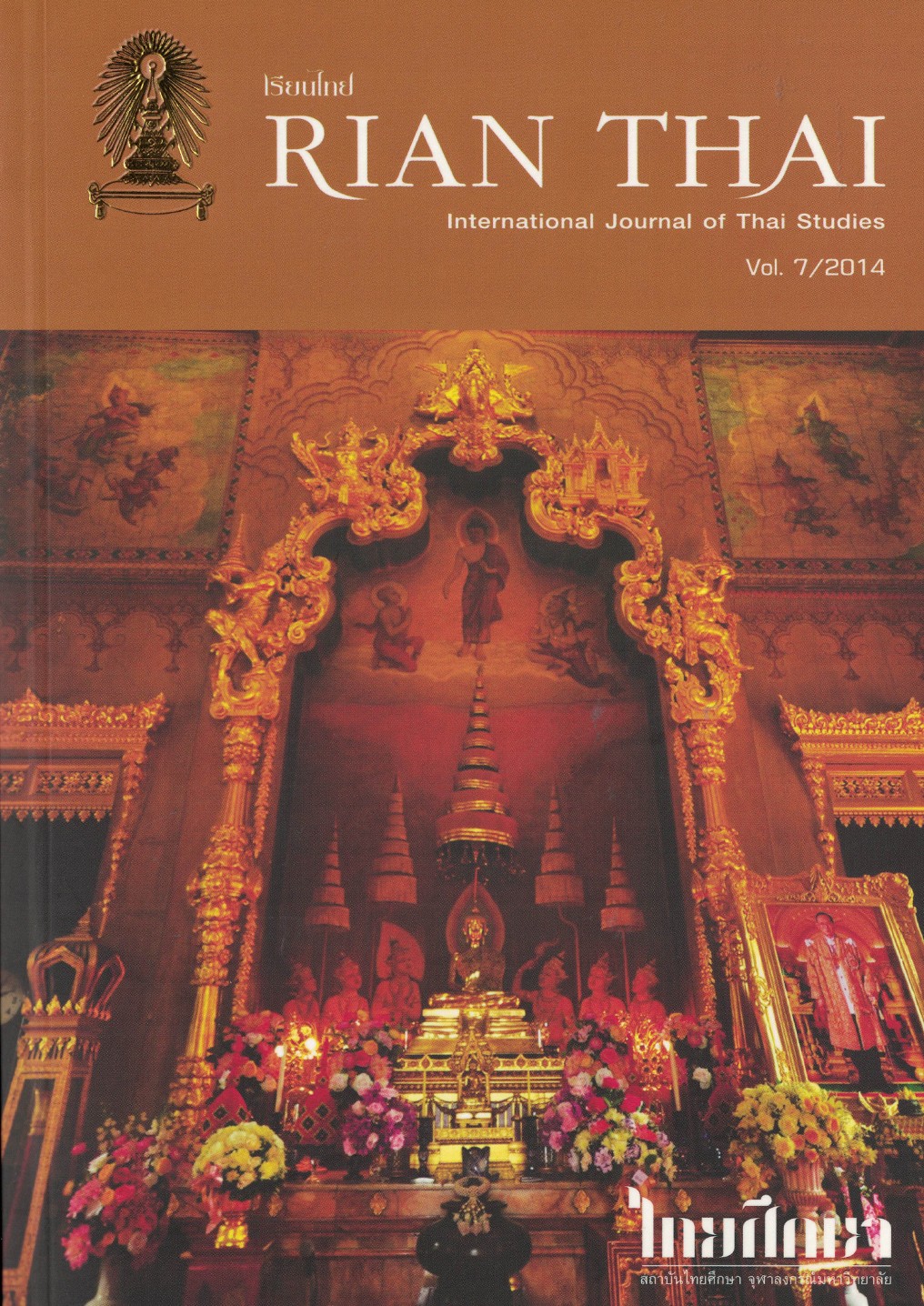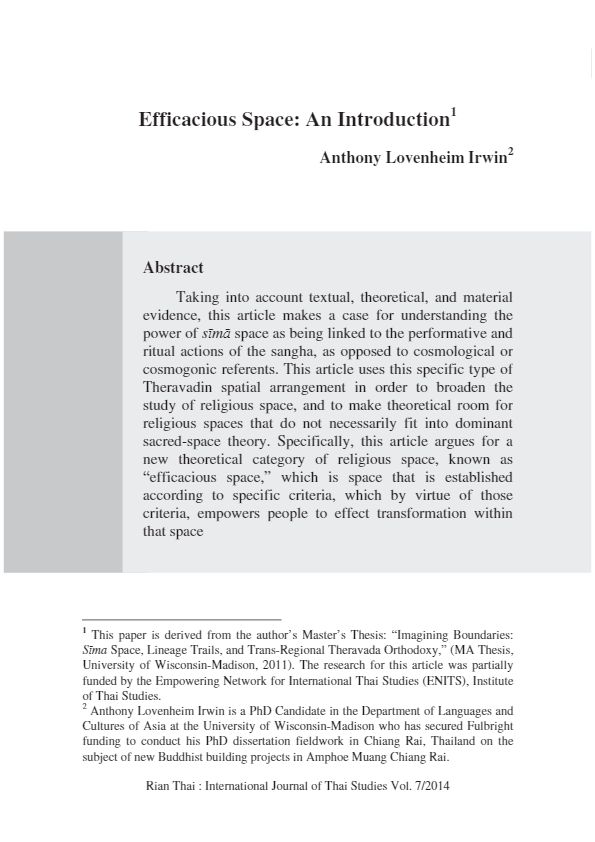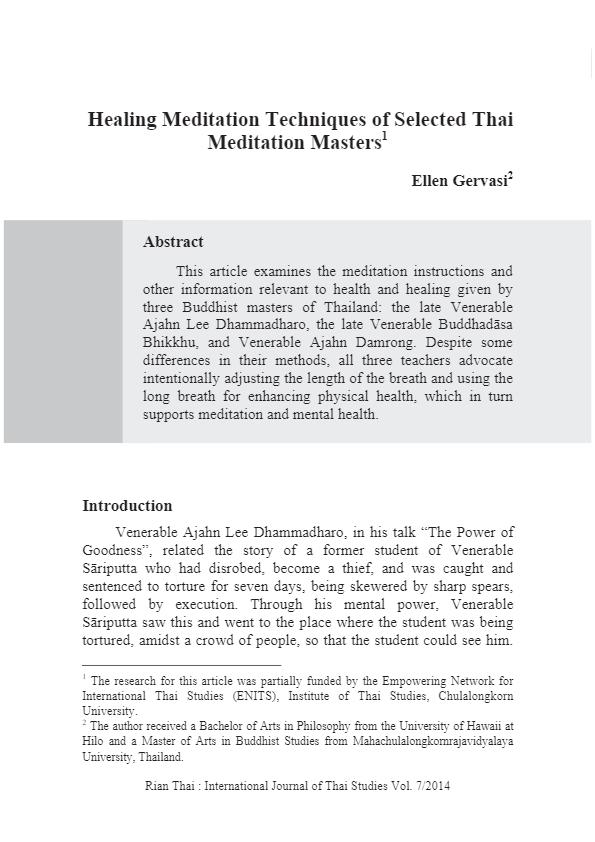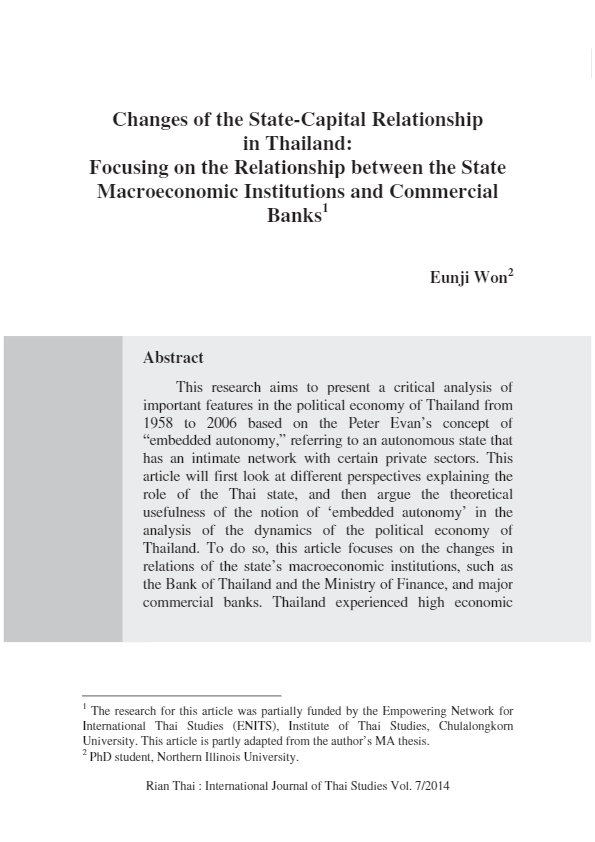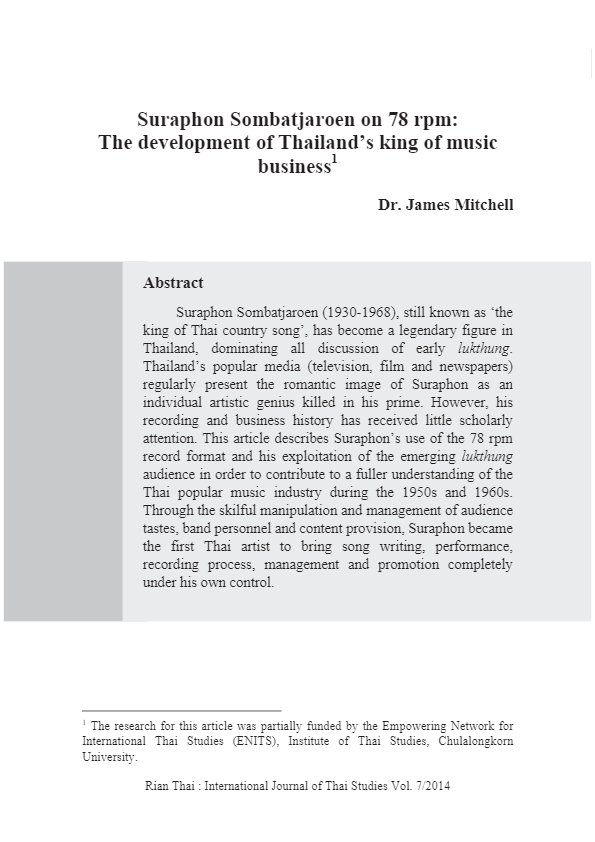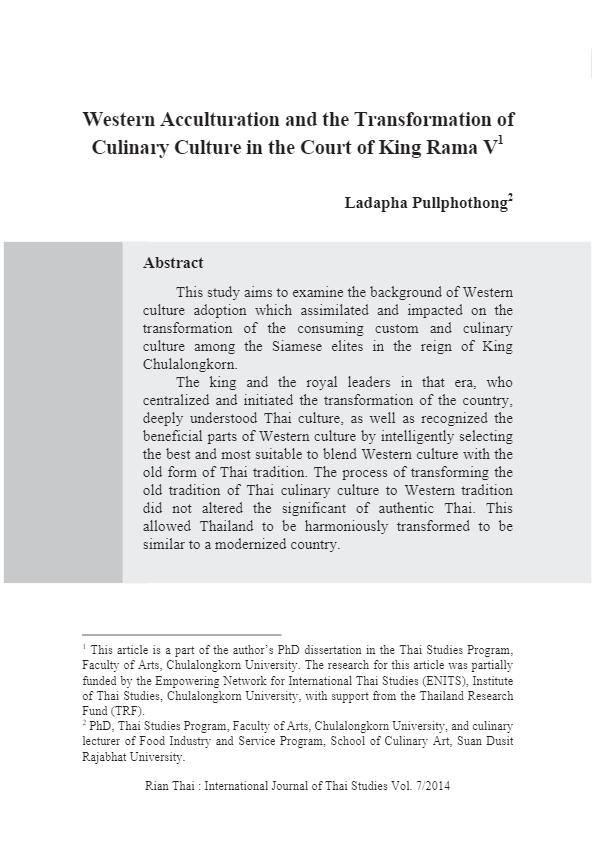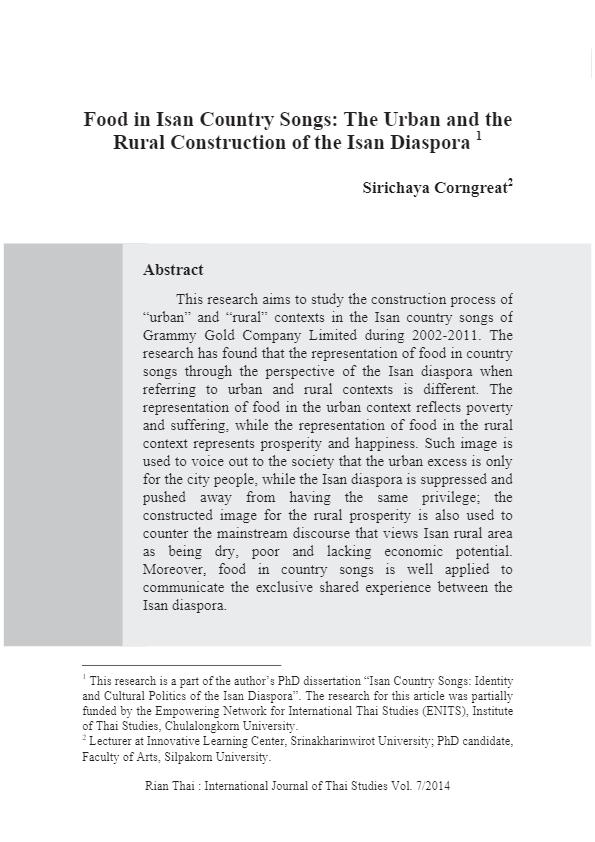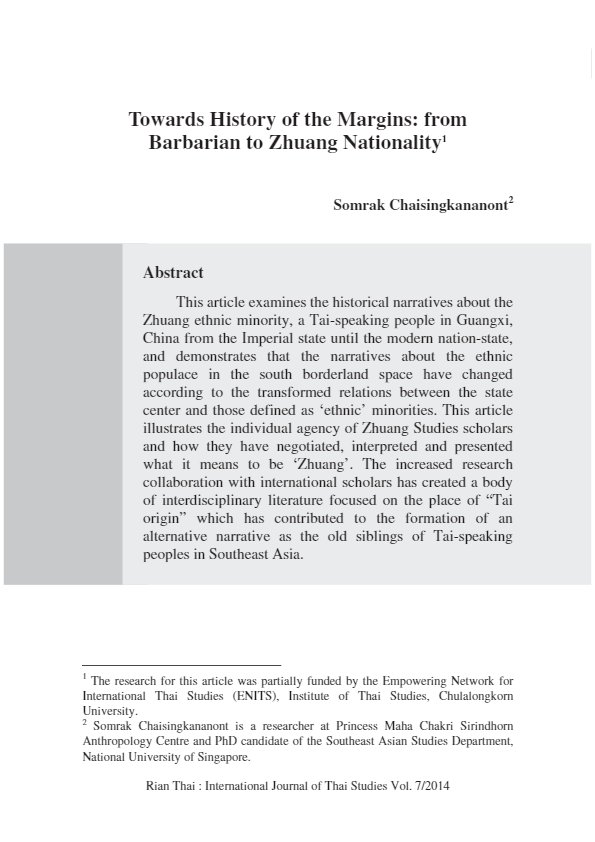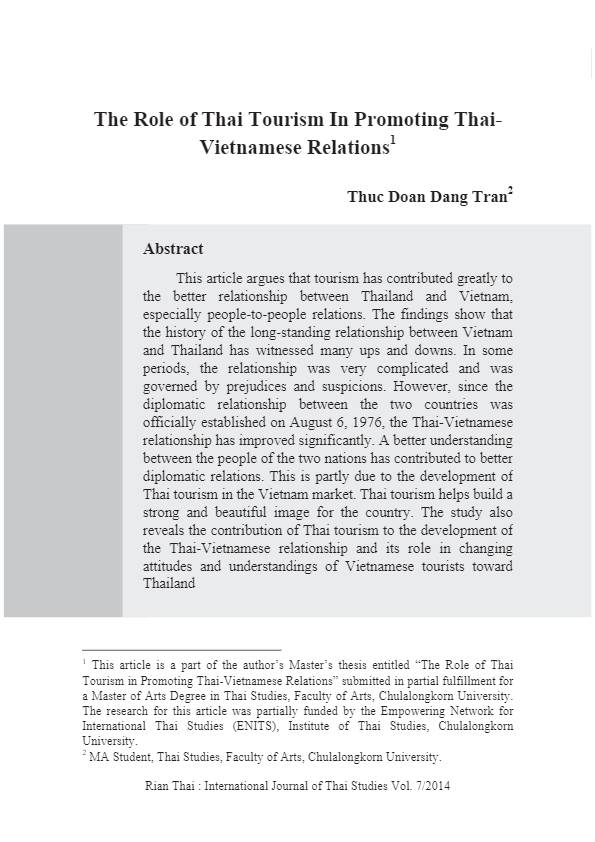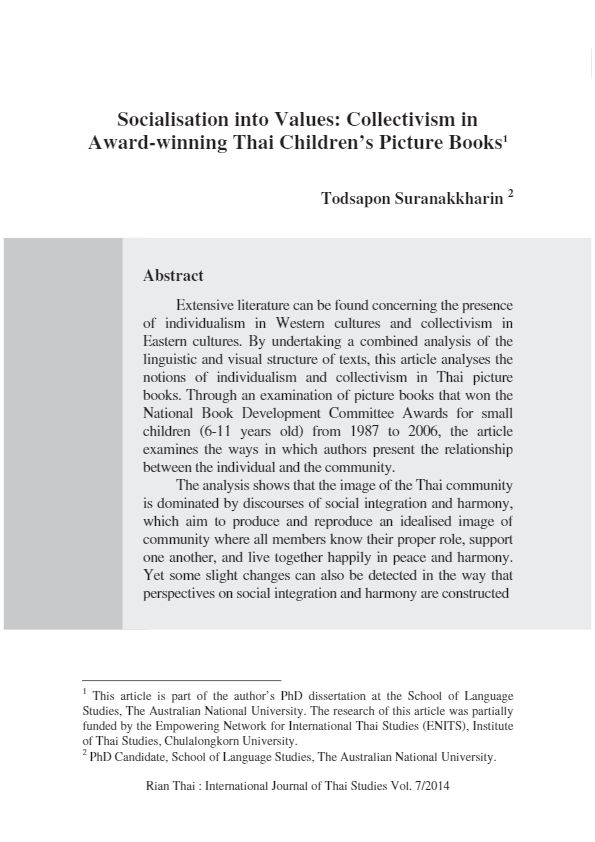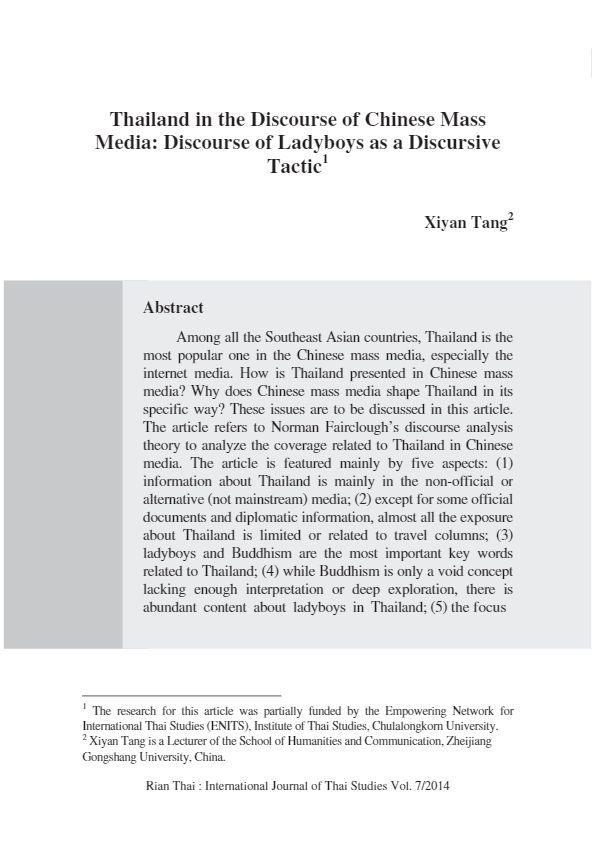Rian Thai - Volume 7/2014
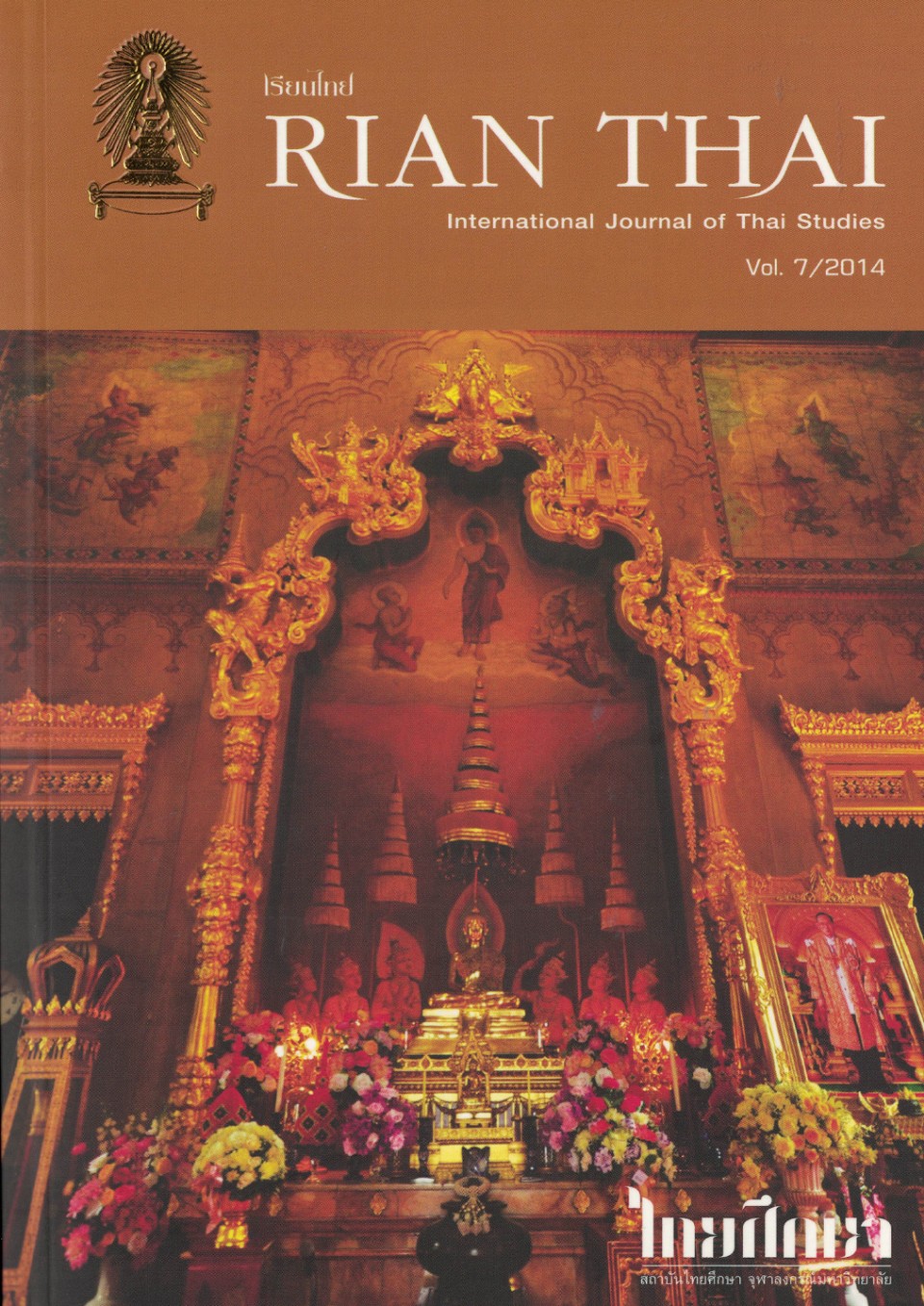
1) Efficacious Space : An Introduction / Anthony Lovenheim Irwin
2) Healing Meditation Techniques of Selected Thai Meditation Master / Ellen Frances Gervasi
3) Changes of the State-Capital Relationship in Thailand : Focusing on the Relationship between the State Macroeconomic Institutions and Commercial Banks / Eunji Won
4) Suraphon Sombatjaroen on 78 rpm : The Development of Thailand’s King of Music Business / James Leonard Mitchell
5) Western Acculturation and the Transformation of Culinary Culture in the Court of King Rama V / Ladapha Pullphothong
6) Food in Isan Country Songs : The Urban and the Rural Construction of the Isan Diaspora / Sirichaya Congreat
7) Towards History of the Margins : from Barbarian to Zhuang Nationality / Somrak Chaisingkananont
8) The Role of Thai Tourism In Promoting Thai-Vietnamese Relations / Thuc Doan Dang Tran
9) Socialisation into Values : Collectivism in Award-winning Thai Children’s Picture Books / Todsapon Suranakkharin
10) Thailand in the Discourse of Chinese Mass Media : Discourse of Ladyboys as a Discursive Tactic / Xi Yan Tang
Efficacious Space : An Introduction
Anthony Lovenheim Irwin
Abstract
Taking into account textual, theoretical, and material evidence, this article makes a case for understanding the power of sama space as being linked to the performative and ritual actions of the sangha, as opposed to cosmological or cosmogonic referents. This article uses this specific type of Theravadin spatial arrangement in order to broaden the study of religious space, and to make theoretical room for religious spaces that do not necessarily fit into dominant sacred-space theory. Specifically, this article argues for a new theoretical category of religious space, known as “efficacious space,” which is space that is established according to specific criteria, which by virtue of those criteria, empowers people to effect transformation within that space.
(Published in Rian Thai: International Journal of Thai Studies, Volume 7/2014, Page 1-18)
Full Text : Download
Healing Meditation Techniques of Selected Thai Meditation Master
Ellen Frances Gervasi
Abstract
This article examines the meditation instructions and other information relevant to health and healing given by three Buddhist masters of Thailand: the late Venerable Ajahn Lee Dhammadharo, the late Venerable Buddhadasa Bhikkhu, and Venerable Ajahn Damrong. Despite some differences in their methods, all three teachers advocate intentionally adjusting the length of the breath and using the long breath for enhancing physical health, which in turn supports meditation and mental health.
(Published in Rian Thai: International Journal of Thai Studies, Volume 7/2014, Page 19-38)
Full Text : Download
Changes of the State-Capital Relationship in Thailand : Focusing on the Relationship between the State Macroeconomic Institutions and Commercial Banks
Eunji Won
Abstract
This research aims to present a critical analysis of important features in the political economy of Thailand from 1958 to 2006 based on the Peter Evan’s concept of “embedded autonomy,” referring to an autonomous state that has an intimate network with certain private sectors. This article will first look at different perspectives explaining the role of the Thai state, and then argue the theoretical usefulness of the notion of ‘embedded autonomy’ in the analysis of the dynamics of the political economy of Thailand. To do so, this article focuses on the changes in relations of the state’s macroeconomic institutions, such as the Bank of Thailand and the Ministry of Finance, and major commercial banks. Thailand experienced high economic performance during the 1960-1980s despite the corrupted relationship between the military, civilian bureaucrats and capitalists. The Thai state’s “bifurcated” features between clientelistic microeconomic management located in line ministries and autonomous and insulated macroeconomic management agencies, such as the Ministry of Finance and the Bank of Thailand, contributed to economic growth. The article then compares how the embedded autonomy of the Thai state has eroded after the democratization, especially after the tycoon-cum-politician Thaksin became the Prime Minister, with previous eras in the context of specific features of the political economy. This research will present the importance of embedded autonomy of the state based on the regulatory discipline to domestic capital in developing countries to overcome stable economic growth and politics.
(Published in Rian Thai: International Journal of Thai Studies, Volume 7/2014, Page 39-65)
Full Text : Download
Suraphon Sombatjaroen on 78 rpm : The Development of Thailand’s King of Music Business
James Leonard Mitchell
Abstract
Suraphon Sombatjaroen (1930-1968), still known as ‘the king of Thai country song’, has become a legendary figure in Thailand, dominating all discussion of early lukthung. Thailand’s popular media (television, film and newspapers) regularly present the romantic image of Suraphon as an individual artistic genius killed in his prime. However, his recording and business history has received little scholarly attention. This article describes Suraphon’s use of the 78 rpm record format and his exploitation of the emerging lukthung audience in order to contribute to a fuller understanding of the Thai popular music industry during the 1950s and 1960s. Through the skilful manipulation and management of audience tastes, band personnel and content provision, Suraphon became the first Thai artist to bring song writing, performance, recording process, management and promotion completely under his own control.
(Published in Rian Thai: International Journal of Thai Studies, Volume 7/2014, Page 67-88)
Full Text : Download
Western Acculturation and the Transformation of Culinary Culture in the Court of King Rama V
Ladapha Pullphothong
Abstract
This study aims to examine the background of Western culture adoption which assimilated and impacted on the transformation of the consuming custom and culinary culture among the Siamese elites in the reign of King Chulalongkorn.
The king and the royal leaders in that era, who centralized and initiated the transformation of the country, deeply understood Thai culture, as well as recognized the beneficial parts of Western culture by intelligently selecting the best and most suitable to blend Western culture with the old form of Thai tradition. The process of transforming the old tradition of Thai culinary culture to Western tradition did not altered the significant of authentic Thai. This allowed Thailand to be harmoniously transformed to be similar to a modernized country.
(Published in Rian Thai: International Journal of Thai Studies, Volume 7/2014, Page 89-104)
Full Text : Download
Food in Isan Country Songs : The Urban and the Rural Construction of the Isan Diaspora
Sirichaya Congreat
Abstract
This research aims to study the construction process of “urban” and “rural” contexts in the Isan country songs of Grammy Gold Company Limited during 2002-2011. The research has found that the representation of food in country songs through the perspective of the Isan diaspora when referring to urban and rural contexts is different. The representation of food in the urban context reflects poverty and suffering, while the representation of food in the rural context represents prosperity and happiness. Such image is used to voice out to the society that the urban excess is only for the city people, while the Isan diaspora is suppressed and pushed away from having the same privilege; the constructed image for the rural prosperity is also used to counter the mainstream discourse that views Isan rural area as being dry, poor and lacking economic potential. Moreover, food in country songs is well applied to communicate the exclusive shared experience between the Isan diaspora.
(Published in Rian Thai: International Journal of Thai Studies, Volume 7/2014, Page 105-129)
Full Text : Download
Towards History of the Margins : from Barbarian to Zhuang Nationality
Somrak Chaisingkananont
Abstract
This article examines the historical narratives about the Zhuang ethnic minority, a Tai-speaking people in Guangxi, China from the Imperial state until the modern nation-state, and demonstrates that the narratives about the ethnic populace in the south borderland space have changed according to the transformed relations between the state center and those defined as ‘ethnic’ minorities. This article illustrates the individual agency of Zhuang Studies scholars and how they have negotiated, interpreted and presented what it means to be ‘Zhuang’. The increased research collaboration with international scholars has created a body of interdisciplinary literature focused on the place of “Tai origin” which has contributed to the formation of an alternative narrative as the old siblings of Tai-speaking peoples in Southeast Asia.
(Published in Rian Thai: International Journal of Thai Studies, Volume 7/2014, Page 131-160)
Full Text : Download
The Role of Thai Tourism In Promoting Thai-Vietnamese Relations
Thuc Doan Dang Tran
Abstract
This article argues that tourism has contributed greatly to the better relationship between Thailand and Vietnam, especially people-to-people relations. The findings show that the history of the long-standing relationship between Vietnam and Thailand has witnessed many ups and downs. In some periods, the relationship was very complicated and was governed by prejudices and suspicions. However, since the diplomatic relationship between the two countries was officially established on August 6, 1976, the Thai-Vietnamese relationship has improved significantly. A better understanding between the people of the two nations has contributed to better diplomatic relations. This is partly due to the development of Thai tourism in the Vietnam market. Thai tourism helps build a strong and beautiful image for the country. The study also reveals the contribution of Thai tourism to the development of the Thai-Vietnamese relationship and its role in changing attitudes and understandings of Vietnamese tourists toward Thailand.
(Published in Rian Thai: International Journal of Thai Studies, Volume 7/2014, Page 161-181)
Full Text : Download
Socialisation into Values : Collectivism in Award-winning Thai Children’s Picture Books
Todsapon Suranakkharin
Abstract
Extensive literature can be found concerning the presence of individualism in Western cultures and collectivism in Eastern cultures. By undertaking a combined analysis of the linguistic and visual structure of texts, this article analyses the notions of individualism and collectivism in Thai picture books. Through an examination of picture books that won the National Book Development Committee Awards for small children (6-11 years old) from 1987 to 2006, the article examines the ways in which authors present the relationship between the individual and the community.
The analysis shows that the image of the Thai community is dominated by discourses of social integration and harmony, which aim to produce and reproduce an idealised image of community where all members know their proper role, support one another, and live together happily in peace and harmony. Yet some slight changes can also be detected in the way that perspectives on social integration and harmony are constructed at certain periods. These changes indicate the strong connection between the discourse of children’s books and the political climate at the time they were published
(Published in Rian Thai: International Journal of Thai Studies, Volume 7/2014, Page 183-216)
Full Text : Download
Thailand in the Discourse of Chinese Mass Media : Discourse of Ladyboys as a Discursive Tactic
Xi Yan Tang
Abstract
Among all the Southeast Asian countries, Thailand is the most popular one in the Chinese mass media, especially the internet media. How is Thailand presented in Chinese mass media? Why does Chinese mass media shape Thailand in its specific way? These issues are to be discussed in this article. The article refers to Norman Fairclough’s discourse analysis theory to analyze the coverage related to Thailand in Chinese media. The article is featured mainly by five aspects: (1) information about Thailand is mainly in the non-official or alternative (not mainstream) media; (2) except for some official documents and diplomatic information, almost all the exposure about Thailand is limited or related to travel columns; (3) ladyboys and Buddhism are the most important key words related to Thailand; (4) while Buddhism is only a void concept lacking enough interpretation or deep exploration, there is abundant content about ladyboys in Thailand; (5) the focus around the ladyboy topic is body/flesh. Considering the dominant ideology in China after 1949, the author argues it is actually a discursive tactic of comparatively weak media which, on the one hand, has to obey the dominant ideology and its related rules in that country, and, on the another hand, hopes to attract its readers to capture the power to break into the array of mainstream media. As a by-product, this tactic has helped to shape the stereotype of Thailand in the Chinese mass media discourse. From the analysis of the discourse of ladyboys, the author also provides insight into the Chinese journalistic expertise, and offers a tripolar interactional expertise model.
(Published in Rian Thai: International Journal of Thai Studies, Volume 7/2014, Page 217-241)
Full Text : Download
